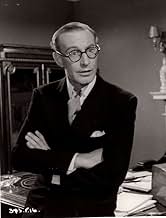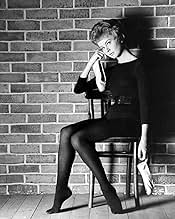Norman Truscott is a store worker who dreams of stardom. Vernon Carew is a singer whose star is fading. Vernon manages to get a recording of Norman singing and passes it off as himself.Norman Truscott is a store worker who dreams of stardom. Vernon Carew is a singer whose star is fading. Vernon manages to get a recording of Norman singing and passes it off as himself.Norman Truscott is a store worker who dreams of stardom. Vernon Carew is a singer whose star is fading. Vernon manages to get a recording of Norman singing and passes it off as himself.
- Director
- Writers
- Stars
Alan Beaton
- Club Member
- (uncredited)
Barbara Bennett
- Lady in Theatre
- (uncredited)
Paul Beradi
- Party Guest
- (uncredited)
Eddie Boyce
- Theatre Patron
- (uncredited)
Richard Caldicot
- Conductor
- (uncredited)
Pauline Chamberlain
- Showgirl
- (uncredited)
- Director
- Writers
- All cast & crew
- Production, box office & more at IMDbPro
6.5669
1
2
3
4
5
6
7
8
9
10
Featured reviews
Classic Norman Wisdom comedy with a beautiful song and a touching romance at its heart
Norman Wisdom was an English comedian much loved during much of the Fifties, and while his success persisted well into the Swinging Sixties, it did so in a spirit redolent of the previous far more innocent decade. His image was that of a perilously naive and inept, yet wholly adorable little man whose sweetness of nature could be said to somehow put the pretensions of souls less humble and self-sacrificing than he to shame. The "Norman" character being a pure-hearted soul for a time when the West's traditional moral values, rooted in its Judeo-Christian foundation, yet possessed considerable influence. And while "Follow a Star", directed by Robert Asher in 1959, with Wisdom appearing as worker and aspiring singer Norman Truscott, is perhaps among his less well-known movies, few are quite so successful in showcasing his incredible talents. While among its many delights are the melodic and moving title song, written by the great man himself, and sung by him in a surprisingly mature baritone crooning voice. Also starring are superb Wisdom regular Jerry Desmonde as irasible fading singer Vernon Carew; Hattie Jacques as Norman's well-meaning but somewhat over-enthusiastic singing teacher Miss Dobson; and the lovely June Laverick, as his sweetheart Judy, who provides Wisdom with the opportunity to present his more serious and romantic side. And who can blame him. While several stalwarts of a classic age of British comedy also appear, including Richard Wattis, as the pompous psychiatrist Dr Chatterway; John Le Mesurier, as the redoubtable waiter Birkett; Fenella Fielding as the elegant Lady Finchington; and Pat Coombs uncredited as a young woman in a theatre. But the movie as a whole is a joy from a simpler time, when Rock and Roll had been more or less shorn of its initial threat, and Beatlemania almost half a decade away.
Norman's Singin' In The Rain
Standard formula for a Norman Wisdom movie here. Norman becomes a put upon clown whilst bubbling under the surface is the fact he's a very talented guy (singer here), whilst he's in love with a wheelchair bound beauty. It's often the saccharine elements of Wisdom's films that puts people off, but to his fans (and I'm one), they are integral to letting Wisdom hit his comedic heights.
Follow a Star is not a great Norman Wisdom film, but it is a very safe and enjoyable one. Story finds Norman used by ageing crooner Jerry Desmonde, who upon finding he is no longer fashionable, plots to use Norman's amazing singing voice as his own. Cue Norman moving in with Desmonde as the house slave and chaos ensues. Meanwhile those closest to Norman smell a rat and try to bring down Desmonde the fraud.
As usual there are plenty of laughs and high energy acrobatics, with stand out sequences involving hypnosis and the bravura mania of the finale - where the dastards do all they can to get Norman off of the stage. Some super British comedy actors fill out the support slots, most notably Hattie Jacques and Richard Wattis, while Philip Green's musical contributions are most pleasing.
One for Wisdom fans only? For sure. Otherwise leave well alone. 6.5/10
Follow a Star is not a great Norman Wisdom film, but it is a very safe and enjoyable one. Story finds Norman used by ageing crooner Jerry Desmonde, who upon finding he is no longer fashionable, plots to use Norman's amazing singing voice as his own. Cue Norman moving in with Desmonde as the house slave and chaos ensues. Meanwhile those closest to Norman smell a rat and try to bring down Desmonde the fraud.
As usual there are plenty of laughs and high energy acrobatics, with stand out sequences involving hypnosis and the bravura mania of the finale - where the dastards do all they can to get Norman off of the stage. Some super British comedy actors fill out the support slots, most notably Hattie Jacques and Richard Wattis, while Philip Green's musical contributions are most pleasing.
One for Wisdom fans only? For sure. Otherwise leave well alone. 6.5/10
Piece of soap opera?
No, rather "rest in peace, my sorrow" extravaganza! I am not a fan of Mr Norman Wisdom. But I enjoy good and easy comedies which, however insane, never get vulgar. This is a perfect example of such thing. I can watch the majority of Charlie Chaplin's, Buster Keaton's, and Norman Wisdom's movies anytime. They are timeless. Very often, when I watch a modern comedy ("Meet the Parents", for instance), I get real angry and ask myself: "WTF? Is this supposed to be good and funny?" Whenever I watch the good old Norman Wisdom movies, I don't have to ask myself such questions - I just rejoice. When I start watching such a movie, I know beforehand that there won't be anything rude, annoying, dirty, and vulgar - this alone supplies me with pleasant feelings.
Again I'm impressed by the talent of Mr Norman Wisdom. The songs he performs are beautiful. There is something "jazzy" about them and I like it.
By the way, in our country the film goes under the title "Mister Pitkin na Estrade" ("Mr Pitkin on the Stage") though the main character is not Pitkin but Norman Truscott. It happens because for Russian audience Mr Norman Wisdom will always be Pitkin on the screen. But that is a sign of quality. Like "Apple" among computers.
"RoboCop", "Batoru Rowaiaru", "Long xiao ye", "Jeeves and Wooster", "Lyudi i manekeny", "Mad Max", and ... "Follow a Star" are all great. Does it look strange? It shouldn't. In my humble opinion, there is a high-quality movie behind each title.
Such comedies like this one are fading away in today's hectic cybernetic world but to me they are the best of the best, because they remain childish and amusing in a very pleasant way.
Again I give a very subjective mark - a 10 out of 10 - but I'm 100% sure that such comedies are of the highest artistic quality. Thank you for attention.
Again I'm impressed by the talent of Mr Norman Wisdom. The songs he performs are beautiful. There is something "jazzy" about them and I like it.
By the way, in our country the film goes under the title "Mister Pitkin na Estrade" ("Mr Pitkin on the Stage") though the main character is not Pitkin but Norman Truscott. It happens because for Russian audience Mr Norman Wisdom will always be Pitkin on the screen. But that is a sign of quality. Like "Apple" among computers.
"RoboCop", "Batoru Rowaiaru", "Long xiao ye", "Jeeves and Wooster", "Lyudi i manekeny", "Mad Max", and ... "Follow a Star" are all great. Does it look strange? It shouldn't. In my humble opinion, there is a high-quality movie behind each title.
Such comedies like this one are fading away in today's hectic cybernetic world but to me they are the best of the best, because they remain childish and amusing in a very pleasant way.
Again I give a very subjective mark - a 10 out of 10 - but I'm 100% sure that such comedies are of the highest artistic quality. Thank you for attention.
The big flaw in one of the film's major plot points...
One of the main plot points of the film is that Norman is afraid to sing in front of anyone, unless his girlfriend is present. And yet the first time we do see him singing it's at the theatre, amidst/in front of an audience, shamelessly upstaging the famous singer who gave him the free tickets in the first place... but his girlfriend couldn't even accompany him because she already had another engagement! Which makes his frequent later complaints that he can't sing because she's not there, ludicrous.
The best thing about the film is the many guest appearances, especially Ron Moody as the doleful violinist. But as far as I'm concerned, Jerry Desmonde is the true star of the film - his television performance of his new hit song is hysterical. But why on earth did Vernon Carew think that Norman's singing voice would revive his career? I can only imagine what Vernon's faithful fans would think of his transition from mellow crooner to sounding - in that particular song - like a cross between Huckleberry Hound and Goofy! (To be brutally frank, I can't believe anyone in the real world would think that was a good singing voice.)
I can't say I'm a huge fan of Norman Wisdom : he's okay in small doses, but quite often his scenes of gurning and capering go on so long they become intolerable. Having an idea of what he was like in real life (thanks to the many TV interviews he gave) it's clear that he had a pretty high opinion of himself and his many talents, and that comes across in his many of his films - especially the later ones where he has more involvement in the writing, staging, and so on.
Quite funny
Norman Wisdom plays a labourer who is also a big fan of singer Vernon Carew. He sees Carew perform live, and manages to annoy the singer from his place in the crowd more than once. The final straw comes when Norman stands up and is singing Carew's famous song, trying to get the crowd properly excited (Carew's stardom is definitely waning) - but what comes to pass is that some head honchos hear Norman's wonderful voice, singing Vernon's song, and get the idea for Norman to dub for Vernon on his up and coming record. The general idea is quite similar to that which was used in Singin' In The Rain, but Follow A Star is not quite that good a movie. Still, it is quite good, and the music isn't bad. 7 out of 10.
Did you know
- TriviaTony Hatch wrote a song for the film, but Norman Wisdom insisted that he should be allowed to write the theme song. Hatch's song was re-titled and used in "Circus of Horrors (1960)."
- GoofsNorman is talking to the hypnotist at 1:10:00 his lips do not match what the voice over is saying about "like I depend on..."
- ConnectionsFeatured in Norman Wisdom: His Story (2010)
- SoundtracksFollow a Star
by Norman Wisdom
Details
- Release date
- Country of origin
- Language
- Also known as
- Enayiler Kralı Yıldızlar Peşinde
- Filming locations
- Production company
- See more company credits at IMDbPro
- Runtime
- 1h 33m(93 min)
- Color
- Sound mix
- Aspect ratio
- 1.37 : 1
Contribute to this page
Suggest an edit or add missing content






























